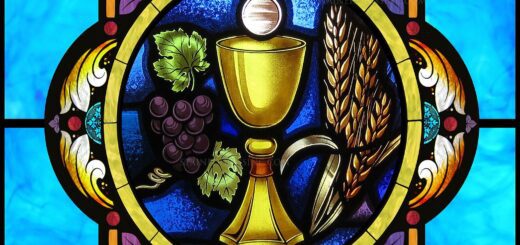Come, Holy Spirit!
“Come, Holy Spirit” – January 21st, 2024 (Joel 2:28, Acts 1:8)
“Equipping the saints,” “come as you are but don’t stay as you are,” “naturally supernatural.” If you’ve been around the Vineyard movement of churches, our church denomination, our extended family within the family that is the body of Christ, you will hear phrases such as these. Today we are launching our new sermon series on these and other phrases that we’re calling “Vineyard Values.” These values inform our faith and practice, each short saying distilled from Scripture to help us as we together follow Jesus.
Before we get started, I want to lay out a simple road map of where we’re going today. There will be three stops along the way:
- The Vineyard
- The Holy Spirit
- Come, Holy Spirit!
1. The Vineyard
We might wonder why we would spend any time talking about our denominational beliefs, practices, theology, or traditions. There’s a very good reason for it. There are more than 45,000 Christian denominations globally. Each theological tradition is both systematic and complex, and has a way of seeing the Christian faith as a whole. None of us arrived on earth during the short time Jesus walked among us. We received the Christian faith as it was transmitted to us through Scripture and through the church. In particular, as followers of Christ, we each received the Christian faith through those who proclaimed and demonstrated the Good News of Jesus to us in word and deed. We can each thank God for and share stories about individuals, families, churches, and ministries who were influential in our own journeys of faith. All Christians tell, teach, sing, and show the same Gospel story, but within each faith tradition, we have our own characteristic styles and emphases. Some things that happen in church may make us feel very uncomfortable, especially when we don’t understand or expect them. Some things that happen in church may make us feel right at home. Just as we each have a family heritage that is often complicated (some parts emphasized, embraced, or celebrated, other parts forgotten, ignored, or discarded), we also have a theological heritage and viewpoint. Here at Liberty Vineyard, we anchor our Christian faith in the beliefs, practices, theology, and traditions of the Vineyard movement, which itself is anchored within the beliefs, practices, theology, and traditions of orthodox Christian faith.
As followers of Christ, you and I are on a journey. We have each arrived here – where we are right now – not as disoriented strangers, but as pilgrims in familiar lands who can recognize old landmarks and remain alert for new and unseen discoveries. Our Vineyard beliefs, practices, theology, and traditions guide us in our conversations with Scripture. We have a pleasant camaraderie with other Christian pilgrims with whom we share the central and most important things, and yet have differing lenses through which to view secondary things. We seek to walk in the wisdom of this well-known 17th century quote, “In essentials, unity; in non-essentials, liberty; in all things, charity.” We make ourselves present to other Christ-followers who are present with us and with those who have gone before. When we interact with other saints, whether in person or through their writings, we experience the unity and the joy of the body of Christ. In humility, we acknowledge that no person or group alone can see, know, understand, or practice the fullness of the Gospel perfectly.
2. The Holy Spirit
I want to read two paragraphs from the Vineyard Statement of Faith (available in full on our church web site) – this section is entitled, “The Ministry of the Holy Spirit.”
“We believe that the Holy Spirit was poured out on the Church at Pentecost in power, baptizing believers into the Body of Christ and releasing the gifts of the Spirit to them. The Spirit brings the permanent indwelling presence of God to us for spiritual worship, personal sanctification, building up the Church, gifting us for ministry, and driving back the kingdom of Satan by the evangelization of the world through proclaiming the word of Jesus and doing the works of Jesus.
We believe that the Holy Spirit indwells every believer in Jesus Christ and that He is our abiding Helper, Teacher, and Guide. We believe in the filling or the empowering of the Holy Spirit, often a conscious experience, for ministry today. We believe in the present ministry of the Spirit and in the exercise of all of the biblical gifts of the Spirit. We practice the laying on of hands for the empowering of the Spirit, for healing, and for recognition and empowering of those whom God has ordained to lead and serve the Church.”
Many Scripture references are provided in our Statement of Fatih to accompany those paragraphs. Let’s look at two of these now to see what we notice and learn about the Holy Spirit.
Joel 2:28 – “I will pour out my spirit on all flesh; your sons and your daughters shall prophesy, your old men shall dream dreams, and your young men shall see visions.”
When Joel wrote this prophecy, it was known and understood by the people of God that God did pour out his Spirit on people, but only in a limited way. They knew that someone who was filled with the Spirit was chosen, appointed, and anointed by God in a special way. What would not have been surprising to the readers to whom the prophecies of Joel were originally written was that when the Spirit of God is poured out, there will be revelation, especially through dreams and visions. When God’s Spirit was poured out on someone, they expected revelation to follow. What would have been very surprising and almost unimaginable would have been that there would be a day when God would pour out his Spirit on ALL flesh, ALL humanity, ALL persons. This is where we find ourselves situated now, living as we are in-between Acts chapter two and Christ’s Second Coming. This era in which we now live is sometimes referred to as “The Age of the Holy Spirit.”
Acts 1:8 (NRSV) – “You will receive power when the Holy Spirit has come upon you; and you will be my witnesses in Jerusalem, in all Judea and Samaria, and to the ends of the earth.”
Jesus is speaking here of what would happen when Joel’s prophecy was fulfilled, as it was on the Day of Pentecost (Acts 2), when the Holy Spirit was poured out and the church was born. The spectacular growth of the early church was not due to savvy promotion, growth principles, or eloquent preaching, but because of the power of the Holy Spirit! And whenever the Holy Spirit comes upon followers of Christ, we receive power which results in us being Christ’s witnesses wherever we go. This means that we become part of the Good News of Jesus Christ, as we are both empowered and sent by the Holy Spirit!
There is so much we can say about the Holy Spirit, but I want to focus today on what we call Holy Spirit gifts and fruits. We may have heard a variety of teachings about these things over the years. We may have even done “gift tests” to figure out who we are, what gifts we’ve been given, how to operate in those gifts, and so forth. No matter where we fall on the spectrum of belief as to who can receive these and when (without getting tangled up in theological knots), I’d like to paint some broad strokes that I hope we will each find helpful (see handout).
There are three major groupings which can be helpful in describing the work of the Holy Spirit:
The gifts of the Holy Spirit (Isaiah 11:1-3) direct both our intellect and our will toward God:
- wisdom (to illumine our minds and to attract us to God),
- understanding (to connect all truths with God’s purposes and to further our understanding of Scripture),
- counsel (to enable us to judge rightly and to see the will of God),
- fortitude (to give us firmness of mind to be able to do good and endure evil),
- knowledge (to enable us to perceive things from God’s perspective),
- piety (to live with reverence for and in total reliance on God),
- fear of the Lord (to grow aware of the glory and majesty of God).
The fruit of the Holy Spirit (Galatians 5:22-23) is a singular term that describes nine attributes of a person or community living in accord with the Holy Spirit:
- love (unconditional benevolence),
- joy (joy in God),
- peace (contentedness in all circumstances),
- patience (refusing to avenge oneself),
- kindness (repaying evil with good),
- goodness (showing mercy to sinners),
- faithfulness (overcoming temptation),
- gentleness (nonviolence),
- self-control (obedience unto death).
The spiritual gifts, or charisms (from which we get our word “charismatic”), are extraordinary or supernatural grace and power given to individual Christians for the common good, to build up the entire church. We find several lists in 1 Corinthians 12-14, Romans 12, Ephesians 4, and 1 Peter 4 that include these spiritual gifts: prophecy, leading, teaching, service, exhortation, giving, mercy, word of wisdom, word of knowledge, increased faith, gifts of healing, working of miracles, visions, discerning of spirits, tongues, interpretation of tongues, helps, governing, and others.
3. Come, Holy Spirit!
I realize that this is a lot to take in. I’ve read these passages many times, and yet the Lord quickened several things to me this week in particular. As we had just remembered the life of Dr. Martin Luther King, Jr. on Monday, I was drawn to the idea that Holy Spirit gentleness has to do with nonviolence. As I felt frustrated and angry this week as I read about some of the evil being perpetrated in the world, I was awakened to a deeper understanding that Holy Spirit fortitude includes not only doing good but enduring evil, not a passive endurance, but a grit that refuses to give up even in the face of great evil. As I admired the dazzling and delicate early morning frost on Wednesday, a decidedly wintry day, I was encouraged to notice that Holy Spirit fear of the Lord draws us ever deeper into wonder. I encourage you to spend some time this week meditating on these lists, sitting with the Lord, allowing the Holy Spirit to pour into you whatever the Holy Spirit desires! As important as it is to know who the Holy Spirit is, it’s also crucial to invite and welcome the Holy Spirit to do what the Holy Spirit does!
Come, Holy Spirit! We need a constant filling of the Holy Spirit, and this ancient prayer is an invitation for the Spirit to touch us again. In a couple of minutes, we’re going to have a Holy Spirit clinic in which we will practice doing just that. I’ll close now with two important reminders, two words which we need to remember whenever we pray, “Come, Holy Spirit”:
1 Corinthians 4:20 – “The kingdom of God depends not on talk but on power.”
1 Corinthians 13:1-2 – “1 If I speak in the tongues of mortals and of angels, but do not have love, I am a noisy gong or a clanging cymbal. 2 And if I have prophetic powers, and understand all mysteries and all knowledge, and if I have all faith, so as to remove mountains, but do not have love, I am nothing.”
Let’s pray. Come, Holy Spirit, fill us with your love and power!
(Wait on and respond to the Holy Spirit)
Handout:
Come, Holy Spirit! (Pastor Karen Sculley – Liberty Vineyard Church – January 21st, 2024)
The gifts of the Holy Spirit (Isaiah 11:1-3) – direct both our intellect and our will toward God:
- wisdom (to illumine our minds and to attract us to God)
- understanding (to connect all truths with God’s purposes and to further our understanding of Scripture)
- counsel (to enable us to judge rightly and to see the will of God)
- fortitude (to give us firmness of mind to be able to do good and endure evil)
- knowledge (to enable us to perceive things from God’s perspective)
- piety (to live with reverence for and in total reliance on God)
- fear of the Lord (to grow aware of the glory and majesty of God)
The fruit of the Holy Spirit (Galatians 5:22-23) – attributes of a person or community living in accord with the Holy Spirit:
- love (unconditional benevolence)
- joy (joy in God)
- peace (contentedness in all circumstances)
- patience (refusing to avenge oneself)
- kindness (repaying evil with good)
- goodness (showing mercy to sinners)
- faithfulness (overcoming temptation)
- gentleness (nonviolence)
- self-control (obedience unto death)
The spiritual gifts / charisms (1 Corinthians 12-14, Romans 12, Ephesians 4, 1 Peter 4) – extraordinary grace and power given to individual Christians for the common good, to build up the entire church (partial list):
- prophecy
- leading
- teaching
- service
- exhortation
- giving
- mercy
- word of wisdom
- word of knowledge
- increased faith
- gifts of healing
- working of miracles
- visions
- discerning of spirits
- tongues
- interpretation of tongues
- helps
- governing




